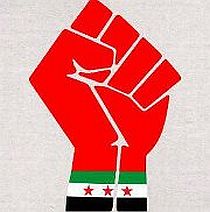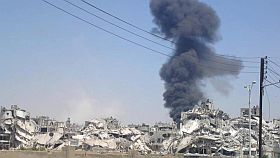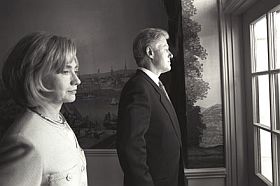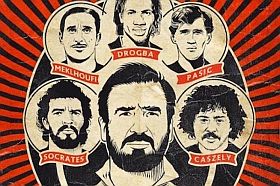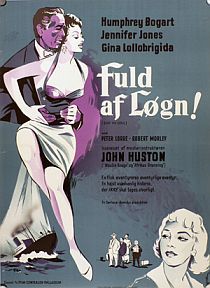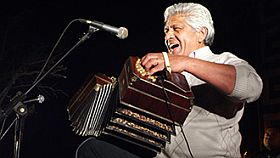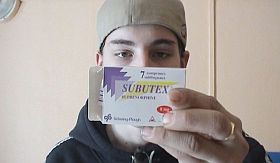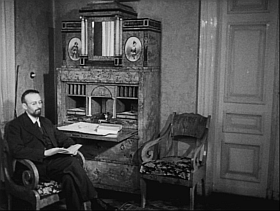Barak Goodman har med sit selskab i Brooklyn, NY lavet en lang række arkiv-baserede, historieformidlende, ”i dybden”, som de selv skriver, tv-dokumentarer: Mai Lai (2010), The Assassination of Abraham Lincoln (2009), The Lobotomist (2008), Kinsey (2005) og en række flere. Jeg har ikke set nogen af dem, men kunne bestemt have lyst, bare på titlerne. Så jeg var spændt, da DR2 i aftes sendte 1. afsnit af Goodmans helt nye Clinton. Men jeg blev faktisk skuffet. OK, der var mange, mange for mig nye oplysninger, men det blev trods den trænede fortæller, Campbell Scotts troværdige stemme til pligtstof for mig, jeg kedede mig faktisk. Der er i serien ellers lagt op til et flot drama med ham og hende, Bill og Hillary, naturtalentet og den intellektuelle slider, den udadvendt folkelige og den tænksomme hjerne bag det fælles foretagende og de store ambitioner, mellem den konstant troløse mand og den atter og atter bedragne kvinde. Der blev blot ikke tid nok til i enkelte scener, i umistelige billeder at låse sådanne store temaer fast. Det er vist ikke, hvad Goodman mener med at gå i dybden, vil gå i dybden med. (“… an in-depth look at the legendary president Abraham Lincoln” står der på dvd-coveret om den film). Det må være noget andet andet, en anden slags dybde. Chokerende nye oplysninger? Også for historikerne? Måske. Der er tre timer tilbage. 2. del sendes i aften 22:50. Jeg hænger på…
2. DEL
Det var godt, jeg fortsatte. Vidnerne står nu klart frem. Og velordnet ensartede. Men der er voldsomt mange medvirkende med analyse-konklusioner, som i klippet sættes på i så voldsom forkortelse, at alle udsagn bliver postulater. Filmen interesserer sig ikke for mellemregningerne, ikke for det lange tøvende i en egentlig samtale. Den vil effektiv fremdrift i en fortælling, som skal nå så meget, som muligt.
Den holdning giver så til gengæld i her i værkets del 2 et overblik fastholdt i hovedafsnit, som jeg bagefter kan huske: Først Vince Fosters selvmord, som berørte Clintonparret dybt og ledte til den plagsomme Whitewatersag, så kampen for det første budget, som endte med sejr på en enkelt marginal, men dog en sejr, som hurtigt gav finanspolitiske resultater af betydning, men så nederlag på nederlag: Krigen i Somalia, Folkemordet i Rwanda, Sundhedsreformen frem til lavpunktet (hedder det, men det er vel som man tager det) nederlaget til republikanernes Newt Gingrich i valgene til Kongressen, hvor Demokraterne mister flertallet i Senatet, valget, som mere end valg af repræsentanter og senatorer blev til et valg for eller imod Clinton. Se det er jo for så vidt et godt overblik over en periode. Mere end pligtstof, dramatisk og spændende fortalt, faktisk. Men hvor er analysen? Den samlede forståelse og holdningen til tingene. Til nu forsvinder den i mere end 15 vidners korte statements. Campbell Scotts fortællerstemme holder sig til begivenhedernes referat, den røber ikke filmens bud på indsigt og forståelse. Sådan samlet. Jeg forstår stadigvæk ikke, hvad Goodman selv mener og hvordan han og hans film placerer sig uden for alt det, der i forvejen menes om den præsident. Hvad er det mon der tilføjes? Barak Goodman med de mange dokumentariske priser vil da andet end filme og holde mikrofon over interviewmedvirkendes hoveder? Der er to afsnit tilbage. I aften og i morgen aften. Jeg må se ordentlig efter, høre ordentlig efter. Det kan nås for mig at finde ud af det…
3. DEL
Nå, sådan er det lavet! Goodmans egen analyse og konklusion og holdning ligger – filmisk faktisk – som en konstruktion af små dele af interviewene, som er limet sammen af den – forstår jeg også nu – omhyggelige og naturligvis velskrevne fortællerstemme. De medvirkende er ikke medvirkende som personer, som personligheder slet ikke. Man ved for alles vedkommende, at de må være fascinerende mennesker. Alle som én. Men her er de stemmer i et samlet kor, samlet i en klippets ordning i en dramatisk fortællekurve. Kun en enkelt skiller sig ud på mærkelig vis, det er Kofi Annan. (Det må jeg finde ud af senere.) Så tv-serien er ikke et udsagn, eller en række udsagn om, men et billede af Clinton og de år, han var præsident. Et pointelistisk billede, et impressionistisk billede, et langt gobelinvævet tapet. Et ordnet flimmer af brudte udsagn. Går jeg tæt på, bliver det uskarpt, går jeg på afstand, læner mig tilbage og tager fortællingen til mig, umiddelbart, vokser tv-værket til et stort epos.
Den gennemførte kronologi kaster nogle gevinster af sig i og med, at jeg jo kender hovedtrækkene i begivenhedsrækken, det er jo alt sammen sket for øjnene af mig. Det er i min tid, og det giver fortællemæssige muligheder, som Barak Goodman udnytter: Whitewater-sagen kan komme op igen og igen, den berømte unge praktikant kan introduceres – men ikke mere, jeg kender hende jo – introduceres de mærkelige dage, hvor Clinton gik alene omkring i regeringskontorerne, for personalet var sendt hjem, han havde ikke penge til lønningerne, fordi lovgivningsmagtens flertal anført af Newt Gingrich og han ikke kunne nå overens om det statslige budget. Min interesse bindes i denne vældige styrkeprøve med de mange pespektiver, som Clinton vinder så grundigt, at det fører direkte til den store sejr ved præsidentvalget i 1996, men jeg ved dog bag dette, at der jo var det der med praktikanten. Jeg ved, at præsidenten tænker på det. Ved andre det? I hvert fald ved de i filmen ikke, vidste de dengang ikke, Clinton slet ikke, at det en dag vil eksplodere – i fjerde og sidste afsnit.
Lige nu før fjerde akt er præsidenten stor og fri. Fri af ham, som opførte sig, som var han præsident, Newt Gingrich, omsider fri af Hillary Clintons medpræsident-funktion, som var uhensigtsmæssig i forhold til de andre nærmeste medarbejdere. Gingrich har regulært tabt og Hillary har klogt indset, at hun må spille på egen bane. Og Clinton viser sig handlekraftig, ikke kun indenrigspolitisk, også udenrigpolitikken tager han på sig skønt skræmt af de afrikanske katastrofer tidligere. Skønt han end ikke har lært at gøre honnør griber han som øverstkommanderende ind og sender USA sammen med NATO i krig mod Serbien og har med ét den anerkendte rolle som den vestlige verdens leder.
4. DEL
Krønikens ubarmhjertige form, den strenge kronologi indebærer således også sine egne slutninger. Og ofte slutter begivenhedsrækken ikke med et markant punktum, den glider ud i mere ens – tlsyneladende ens dage. Clinton har 700 af den slags dage tilbage i det hvide hus efter Lewinsky sagen, som fylder meget af fjerde akt, vel nok alt for meget. De 700 dage synes jeg følgelig der skulle være gjort mere ud af, for dem ved jeg på forhånd mindre eller intet om. De gør mig nysgerrig.
Det smukke arkivfoto, som sidder i toppen af dette blogindlæg, bruger Barak Goodman til fortællingen om samtalen mellem de to, mellem ham og hende, da han omsider indrømmer, at han var hende utro med den unge kvinde i regeringskontorerne. De to ser ikke på hinanden, ser ikke hinanden, de ser hver deres vej, men parallelt, på lige fod, lige stærke. Og sådan bliver det. Hun arbejder herefter på at vinde og vinder guvernørposten i New York, hun har nu sin egen karriere, sit eget liv. Han hjælper hende, men han har først og sidst sin lange afslutning, sine 700 dage.
Det betydningsladede arkivbillede, billedsiden til den afgørende scene, bliver også det centrale element i tv-seriens plakat, som fastholder tv-dokumentarens shakespearske plot omkring erotik, ambition og magt.
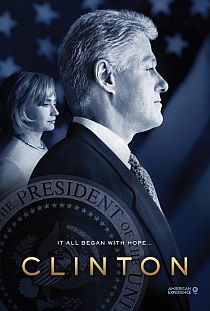
Barak Goodman: Clinton, USA, 2012, 4×50 min., manuskript: Barak Goodman, fotografi: Stephen McCarthy, klip: George O´Donnell og Nancy Novack, produktion: Ark Media Barak Goodman, Chris Durrance og Jamila Ephron. Sendtes på DR2 16.-19. juli 2012.



